23 Essential Shopify Statistics You Need to Know in 2026

Contents
Initially founded in 2006, Shopify is a Canadian eCommerce company that allows merchants to create their own online stores.
Anyone interested in selling products online can pay a monthly fee to Shopify in order to access their services and create a personalised storefront. It’s a helpful tool for those looking to start a business or for those wanting to build a more efficient shopping experience.
To help you learn more about Shopify and the success it’s seen over the years, we’ve compiled a list of Shopify statistics that you need to know in 2026.
They just might have you rushing to build your own Shopify store to sell your awesome products.
Stay up to date
Top Shopify Statistics
To get started, let’s go over some of the top Shopify statistics that you need to know if you’re considering creating your own store on their platform.
Shopify Generated $7 Billion in 2023
One of the most impressive Shopify statistics is that the platform made $7 billion in revenue during 2023. This number has increased by more than $5 billion since 2015, showing the platform’s steady growth over time.
Shopify Has Contributed to $444 Billion in Global Economic Activity
Shopify has had a great impact on the economy globally. Thus far, they’ve contributed to $444 billion in global economic activity, a number that will only increase in recent years as more companies use it to manage their online storefronts.
Shopify’s Share Price on the U.S. Stock Exchange is Growing - $145.76 in October 2025
Over the past few years, the stock price of Canada's e-commerce powerhouse, Shopify, has seen a substantial climb. It surged from $10.10 in December 2017 to $145.76 in October 2025. Notably, during the peak of the COVID-19 pandemic in 2020 and 2021, the price soared even higher, hitting a zenith at $152.48 per share in August 2021. The widespread closure of brick-and-mortar stores and global mobility restrictions triggered by the pandemic fueled remarkable growth in the e-commerce sector, a trend clearly mirrored in the upward trajectory of Shopify's stock price.
There are 48,426 Shopify Plus Stores in 2024
Shopify Plus is an enterprise version of the Shopify platform. It’s only available to merchants with revenues between $1 million and $500 million. What’s the difference between Plus and the basic version of Shopify? It has a variety of improvements that are enticing to top sellers on the platform. Over 48,426 businesses are using Shopify Plus across 175 countries.
43.55% of Shopify Traffic Comes From Mobile Devices
If you need a reminder to deliver an amazing shopping experience via mobile, this is it. 43.55% of traffic to Shopify stores comes from a mobile device, such as a phone or tablet. This is why it’s important to make sure your storefront works on all devices to make the checkout process as painless as possible. Plus, this number has increased in recent years.

500K+ Shopify Stores Sell Apparel, Making it the Most Popular Industry
By June 2023, fashion businesses took the lead as the most significant users of Shopify, boasting over 500,000 online apparel stores on its e-commerce platforms. Following closely, home and garden secured the second spot, with around 220,000 stores using Shopify's services.
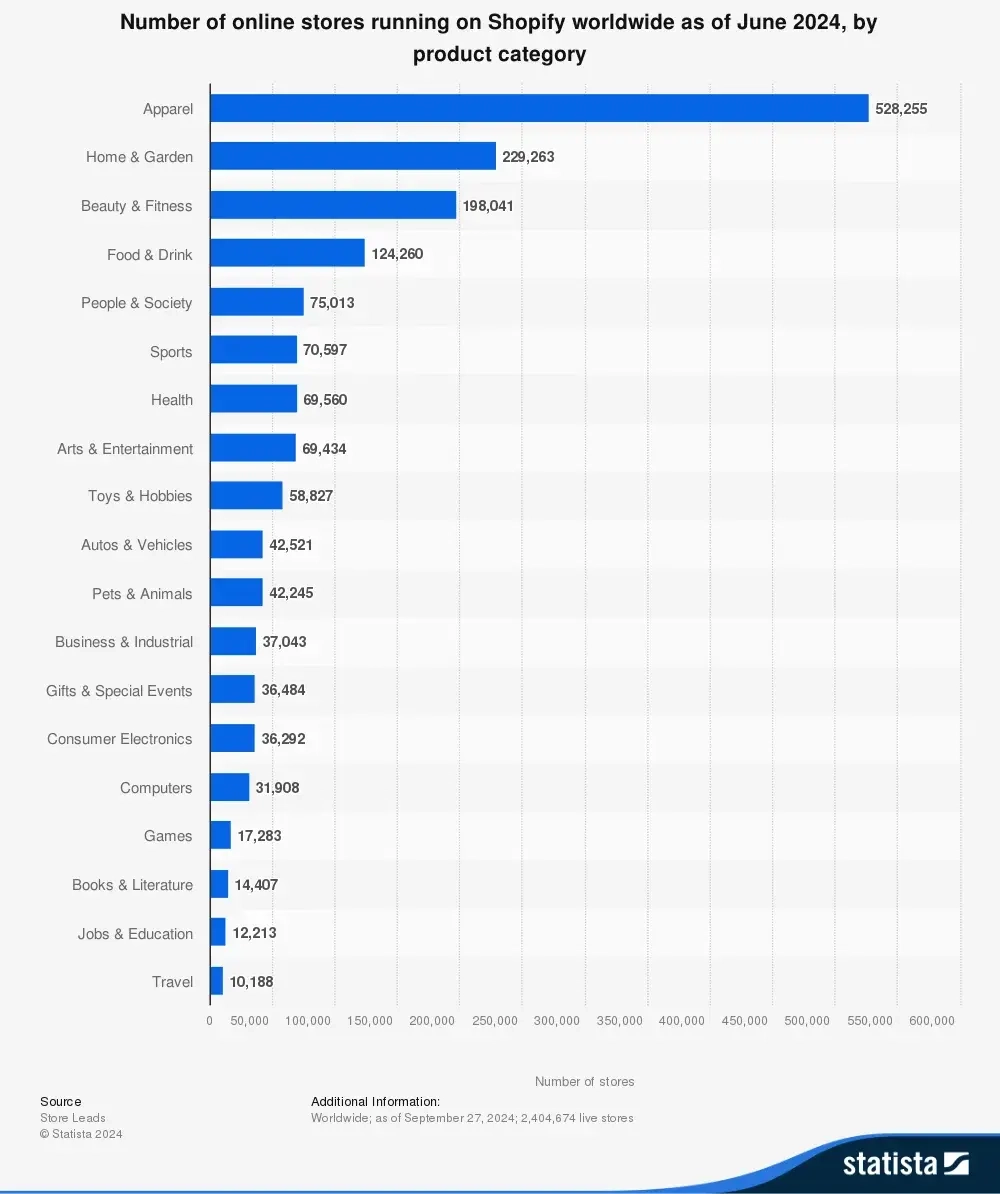
Global Shopify Statistics
With merchants in over 175 countries, Shopify truly has a global impact that cannot go unnoticed. Since its launch, it’s become a go-to service for those wanting to make a living selling goods online. Here are some global Shopify statistics you’ll find interesting:
Shopify Has More Than 2.1 Million Daily Active Users
Curious how many people are actually accessing Shopify on a daily basis? It turns out they have approximately 2.1 million daily active users. This number can go up or down depending on the day, but it shows that a decent number of people are browsing and purchasing from their online storefronts every day.
Shopify is the Biggest Name in the U.S. eCommerce Software Market
For those looking to build an online storefront, there are a plethora of options to choose from. However, Shopify is the biggest name in the U.S. when it comes to the eCommerce software market.
As of September 2024, it was used by about 30% of websites with eCommerce capabilities. Its major competitors included Wix, Squarespace, and WooCommerce, all of which had a market share of at least 15%.
Around Two-Thirds of Shopify Stores Are Based in the Americas
Most of the online shops hosted through Shopify have been created by customers based in the Americas. In fact, about two-thirds of Shopify stores are based there. With 51,394 shops, Europe accounted for about 17% of Shopify’s market.
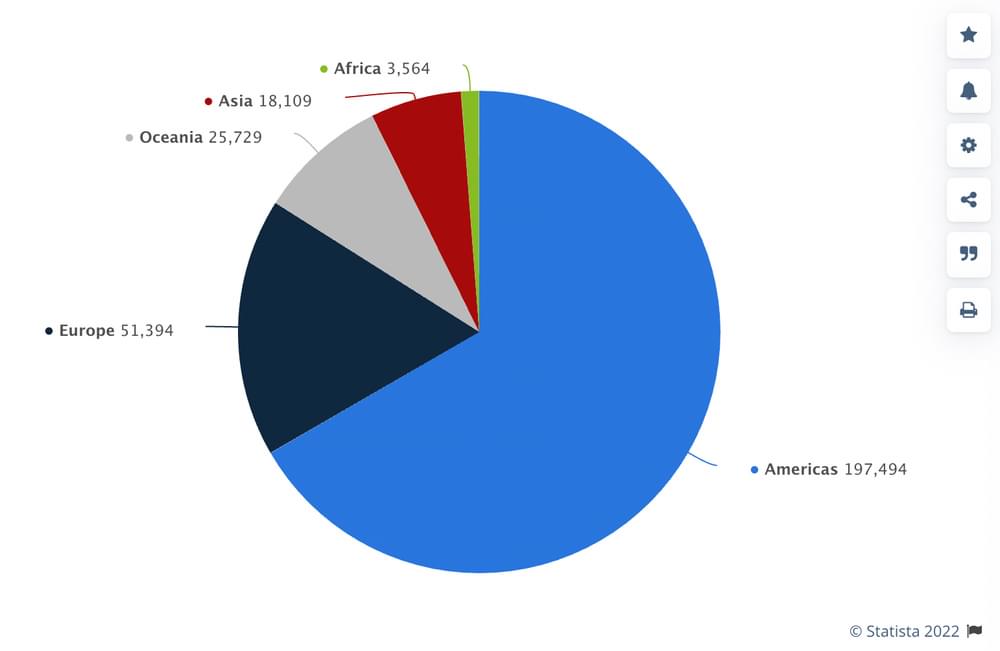
UK Shopify Statistics
For our fellow friends in the UK, we wanted to share some Shopify statistics that share data about this region alone. Here’s some interesting data regarding Shopify usage in the UK:
Shopify Stores Increased by 14/09% Year-Over-Year in the Last Quarter of 2025
The amount of active UK-based stores on Shopify continues to grow as more people are launching online businesses. With a 14.09% year-over-year increase, it’s safe to say Shopify continues to be a popular platform that holds its own against competitors.
Shopify Holds 23% of the Market Share in the UK, With Wix Stores in the Lead
Shopify doesn’t come out on top in the UK. As of September 2024, Wix Stores actually held the maximum market share in the UK. It had 24% of the total. Meanwhile, Shopify followed closely behind with just 23%.
There Are About 184,825 Shopify Stores Based in England
When looking at the Shopify merchants in the UK, a majority of them are located in England, with about 184,825 stores originating from there. The location with the second most amount of stores in Scotland, with 10,308. Wales comes in third with 5,698 Shopify stores.
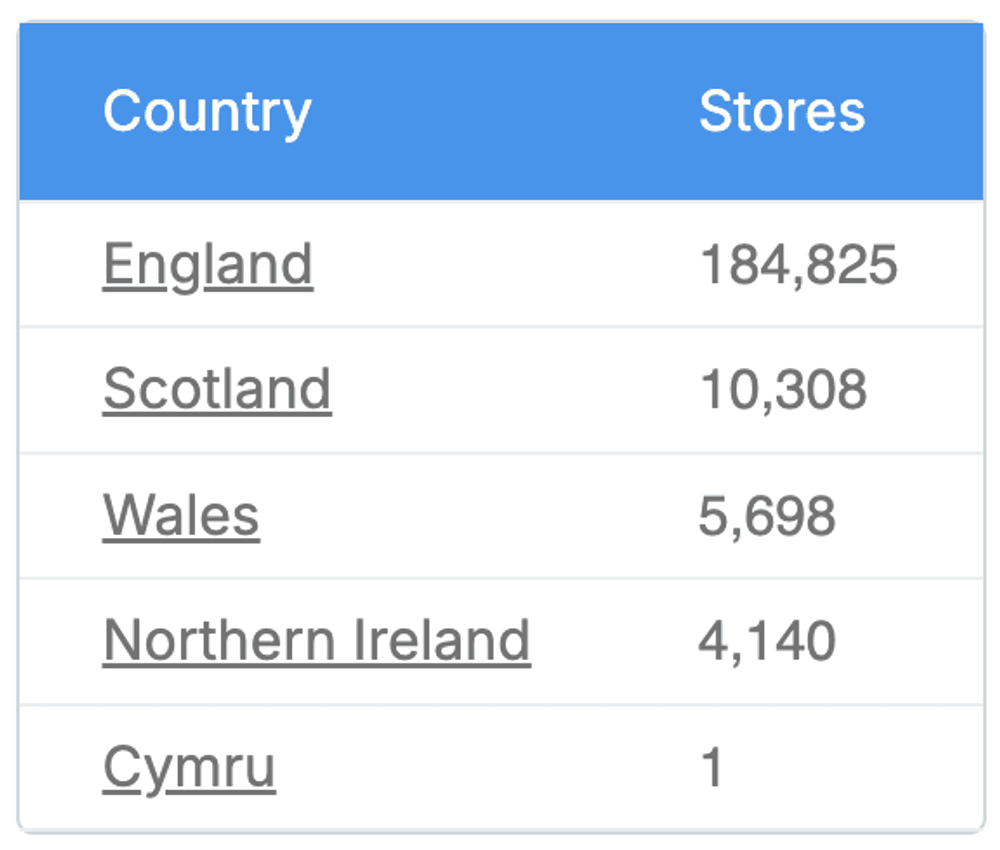
51.4% of UK-Based Shopify Stores Use Instagram
Social media is a powerful way to get the word out about your offerings, which is why so many eCommerce store owners rely on it. Instagram is the favourite platform among Shopify merchants in the UK, with 51.4% of them posting there. Facebook falls just behind at 33.4%, and then TikTok comes in at 14.9%. Twitter (X) has now fallen off the top 3.
Shopify Growth Statistics
Since 2006, Shopify has seen some pretty impressive growth in terms of the number of merchants joining the platform and the number of customers making purchases. Check out these statistics to see just how much they’ve expanded in recent years:
More Than 2.06 Million Merchants Sell on Shopify
Shopify statistics show there’s been steady merchant growth ever since 2012, with more people wanting to sell their products online. Here’s a breakdown of its merchant count over the past few years:
- 41,000 merchants in 2012
- 375,000 merchants in 2016
- 1 million+ in 2019
- 2 million+ in 2021
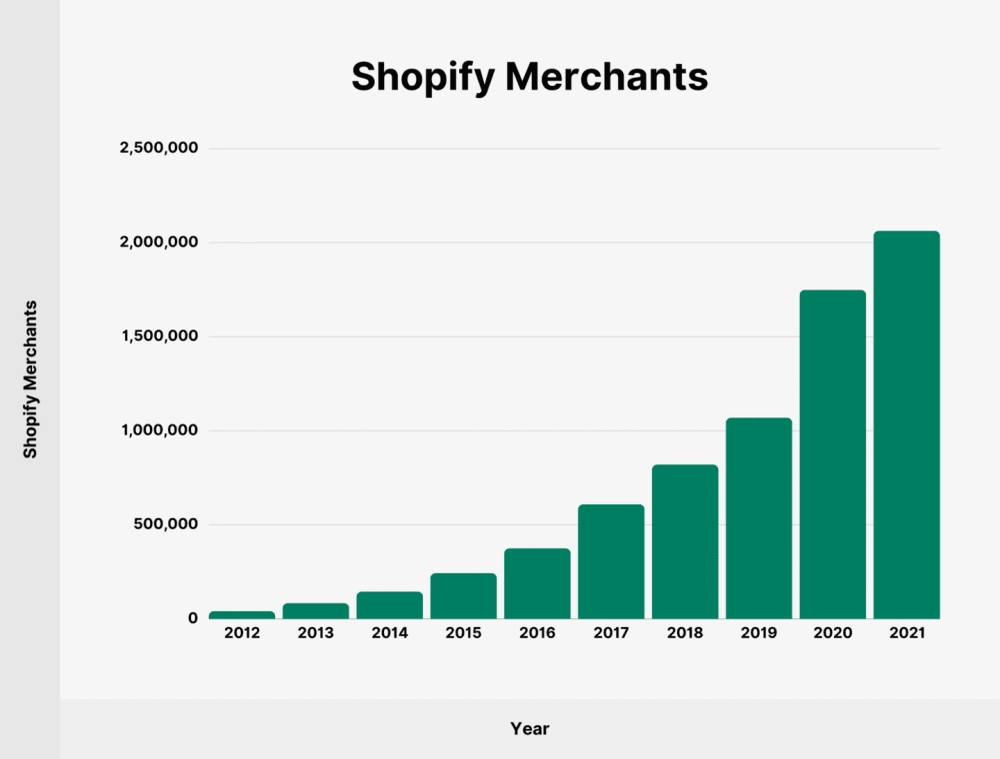
675 Million People Bought from a Shopify Store
Looking at just the sales in 2023, 675 million people bought from a Shopify store. This number has increased by 47.7% since 2020.
Shopify App Statistics
Did you know Shopify has an app store with different plugins to customize your storefront? It’s true! There are apps to enhance your store design, market your business, and source and sell your products.
Here are some interesting stats about their app store you may want to know:
The Shopify App Store Contains 11,900 Apps
There are 11,900 apps in the Shopify App Store.
Over 4.7 Million Sellers Use Shopify
Last year, more than 4.7 million sellers chose Shopify to set up and manage their online stores. Interestingly, considering there are roughly twice as many live websites created with Shopify, it suggests that, on average, each seller is behind about two distinct Shopify websites. It's like a double dose of Shopify creativity from each merchant!
Shopify for Business Statistics
Businesses looking to create an online storefront are likely going to consider Shopify because it’s one of the biggest contenders in the eCommerce market space.
To help you in making your decision between their platform and others, here are some Shopify statistics to keep in mind:
69% of Online Sales During BFCM Took Place via Shopify Merchants
Anticipated to hit a whopping $4.8 trillion in 2025, the global ecommerce market is on a steady rise. The continuous growth in the coming years underscores the lucrative prospect of borderless ecommerce for online retailers. Looking forward to 2024, a substantial 21.2% of all retail sales are projected to occur online. Notably, in 2022, mobile shopping via Shopify merchants stole the show, grabbing a significant 69% of online sales during the Black Friday Cyber Monday (BFCM) extravaganza.
Shopify Has An Average Returning Customer Rate of 27%
As revealed by a study conducted by RJMetrics, Shopify stores boast an average returning customer rate of around 27%. It's worth noting that this is an average, and individual stores may experience significantly higher or lower returning customer rates based on their unique circumstances. In this context, a returning customer is defined as someone who has made at least two purchases from a specific store.
$72 Was the Average Revenue Per Shopify Customer in 2022
If your Shopify store earned $226 in revenue per customer, you’d find yourself among the 10% of the best-performing stores on their platform. However, the average revenue per customer in 2022 was just $72. Anything below $33 and your shop would be among the bottom 10%.
Email Marketing Has a 4.29% Conversion Rate for Shopify Stores
To increase the conversion rate of your Shopify store, email marketing is the clear winner. It had a higher conversion rate than other tactics, making it a powerful way to drive sales. If you learn anything from these Shopify statistics, it’s that you should be emailing your list about products. Here’s a full breakdown of the conversion rate for each tactic:
- Email marketing: 4.29% conversion rate
- Search: 3.04% conversion rate
- Direct: 2.93% conversion rate
- Social media: 1.81% conversion rate
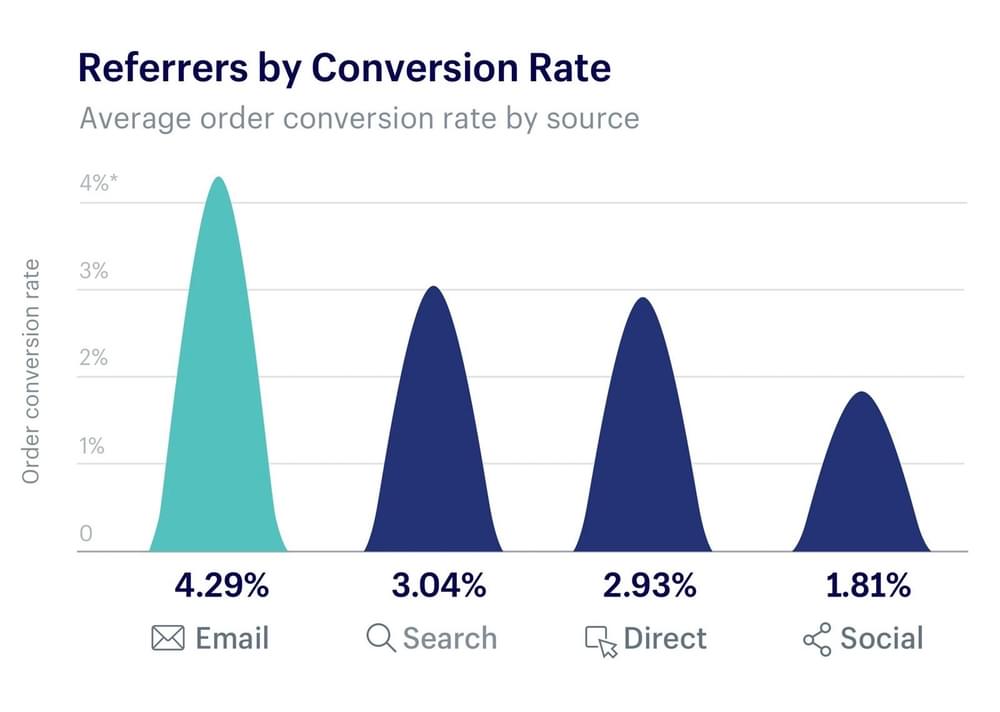
Biggest Stores on Shopify
Some of your favourite brands are using Shopify to create their online storefronts, so you’ll be in good company should you decide to jump on board with their platform. Check out some of their top merchants to see who else relies on Shopify to sell their products:
Tesla is one of the Biggest Companies Using Shopify
If it’s good enough for Tesla, it’s good enough for your brand, right? Well known for its electric cars, Tesla has a Shopify-built online store that sells car charges, vehicle accessories, and even apparel.
Sephora is Another Popular Shopify Merchant
Owned by LVMH, Sephora operates an online store alongside its 2,600 retail stores worldwide. This allows them to reach customers easily and effortlessly, so they can shop from the comfort of their own homes.
Nestlé Rounds Out the Top Three Merchants on Shopify
Nestlé is known for its beverage and food products, such as its coffee makers and instant coffee. As they’re a B2C company, they need to make it easy for customers to purchase their offerings. And it just so happens they do this using Shopify.
Using These Shopify Statistics
As you’re building an online storefront to sell your products, use these Shopify statistics to aid in deciding which platform you go with. Shopify is a real contender with an impressive market share worldwide. Plus, it’s clear the businesses using Shopify for their stores have had great success so far.
Enjoyed reading these statistics? Find more statistics you need to know in 2026.

You might also like
Don’t be sheepish
let’s talk








